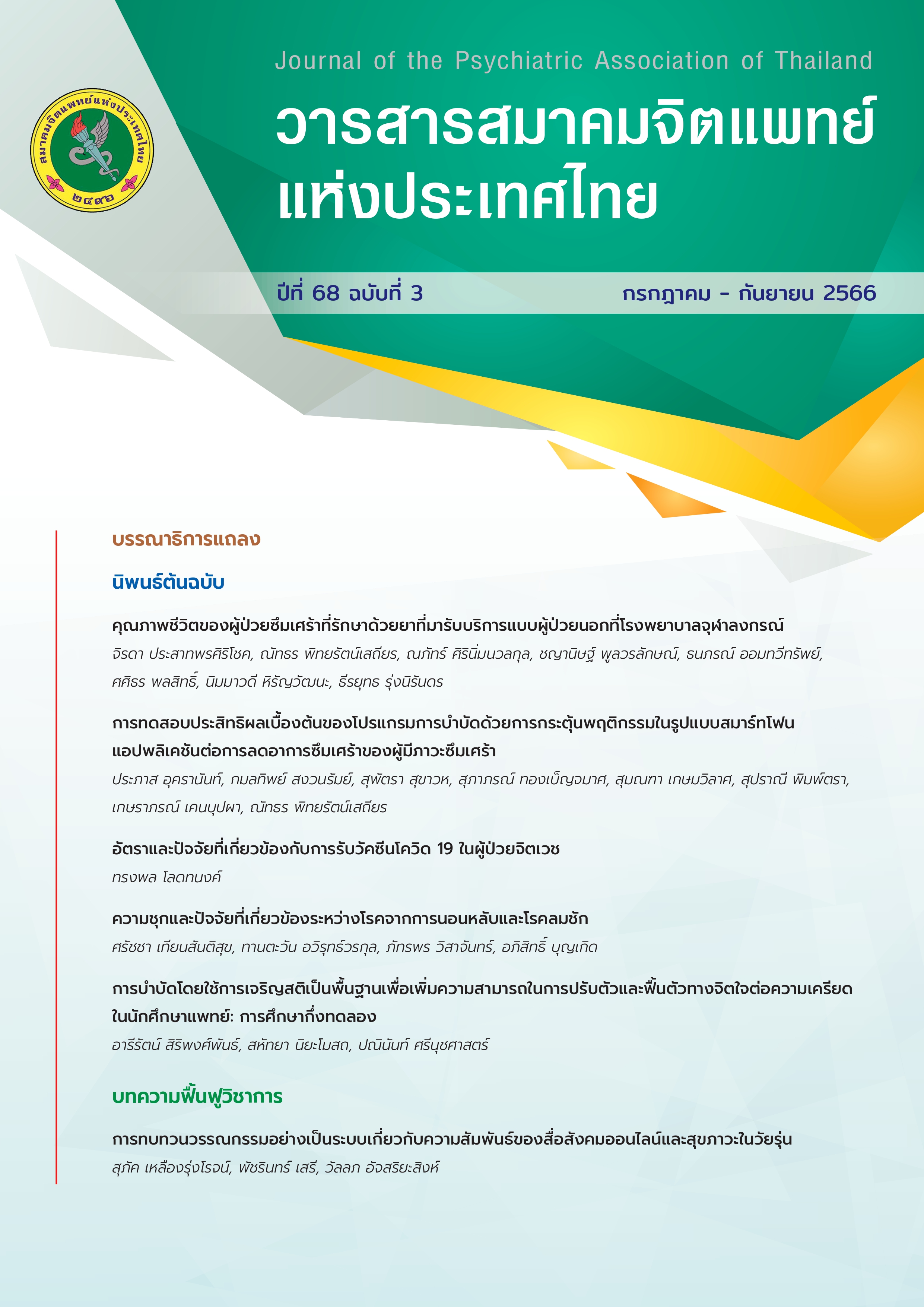Preliminary Efficacy of Behavioral Activation Smartphone Application for Reducing Depressive Symptoms in Depression
Main Article Content
Abstract
Objective: The aim of this study was to determine the preliminary efficacy of a behavioral activation smartphone application in reducing depressive symptoms among individuals with depression.
Methods: This study employed a one-group pre-posttest design. The behavioral activation smartphone application was adapted from a face-to-face behavioral activation program and was named "Mind Alert." Participants engaged in six sessions with a therapist and utilized the smartphone application continuously for two months. The study included seventeen individuals between the ages of 18 and 35, who were experiencing mild to moderate depressive symptoms as assessed by a nine-item questionnaire. Depression scores were evaluated using the nine-item questionnaire before and after the intervention to measure the outcomes. The team of therapists consisted of seven members, including five psychiatric nurses and two social workers, who were trained in the program and had previous experience working in a hospital setting. Data analysis was conducted using the Wilcoxon signed-rank test.
Results: The preliminary efficacy findings of the behavioral activation smartphone application revealed that the depression scores of participants significantly decreased from pre-intervention to post-intervention (p < .05). Participants expressed high satisfaction with the Mind Alert application, stating that it helped them plan and engage in behavior that brought happiness and ultimately reduced their depressive symptoms.
Conclusion: The results suggest that the behavioral activation smartphone application can contribute to reducing depressive symptoms among individuals with depression, particularly those with mild to moderate symptoms. However, it is crucial for therapists to receive training and gain experience in using the Mind Alert application before providing it as a therapeutic tool for individuals with depression.
Article Details

This work is licensed under a Creative Commons Attribution-NonCommercial-NoDerivatives 4.0 International License.
Articles submitted for consideration must not have been previously published or accepted for publication in any other journal, and must not be under review by any other journal.
References
Spijker J, Graaf R, Bijl RV, Beekman AT, Ormel J, Nolen WA. Functional disability and depression in the general population. Results from the Netherlands Mental Health Survey and Incidence Study (NEMESIS). Acta Psychiatr Scand 2004;110(3):208-14.
Kessler RC, Bromet EJ. The epidemiology of depression across cultures. Annu Rev Public Health 2013;34:119-38.
Lewinsohn PM. A behavioural approach to depression. Oxford: Wiley; 1974.
Mazzucchelli T, Kane R, Rees C. Behavioral activation treatments for depression in adults: A meta-analysis and review. Clinical Psychology: Science and Practice. 2009;16(4):383-411.
Ekers D, Webster L, Van Straten A, Cuijpers P, Richards D, Gilbody S. Behavioural activation for depression; an update of meta-analysis of effectiveness and sub group analysis. PLoS One 2014;9(6):e100100.
Ly KH, Trüschel A, Jarl L, Magnusson S, Windahl T, Johansson R, et al. Behavioural activation versus mindfulness-based guided self-help treatment administered through a smartphone application: a randomised controlled trial. BMJ Open. 2014;4(1):e003440.
Ly KH, Topooco N, Cederlund H, Wallin A, Bergström J, Molander O, et al. Smartphone-supported versus full behavioural activation for depression: A randomised controlled trial. PLoS One. 2015;10(5):e0126559.
Sukhawaha S,Sanguanrum K, Ukranan P, Thongbenjamas S,Ditung H. Prelimary efficacy testing of Behavioral Activation therapy for reduce depressive symptoms in patients with depression. The 22th WPA World Congress of Psychiatry. Retrieved 3-6 August 2022; Bangkok 2022.
Kongsuk T, Arunpongpaisal S, Janthong S, Prukkanone B, Sukhawaha S, Leejongpermpoon J. Criterion-related validity of the 9 Questions Depression Rating Scale revised for Thai Central Dialect. J Psychiatr Assoc Thailand 2018;63(3):321-34.
Dahne J, Lejuez CW, Diaz VA, Player MS, Kustanowitz J, Felton JW, et al. Pilot randomized trial of a self-help behavioral activation mobile app for utilization in primary care. Behav Ther 2019;50(4):817-27.
Dimidjian S, Barrera M, Jr., Martell C, Muñoz RF, Lewinsohn PM. The origins and current status of behavioral activation treatments for depression. Annu Rev Clin Psychol 2011;7:1-38.
Bardram J, Rohani D, Tuxen N, Faurholt-Jepsen M, Kessing L. Supporting smartphone-based behavioral activation: a simulation study2017. 830-43 p.


